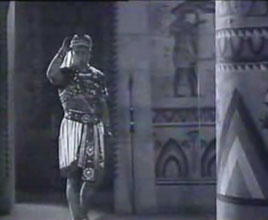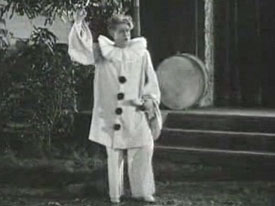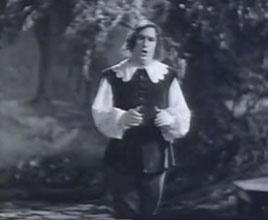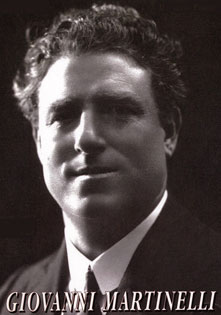 Italian tenor Giovanni Martineli is forgotten today, but was once regarded as the natural successor to Caruso. He stars in the musical short Celeste Aida (1926).
Italian tenor Giovanni Martineli is forgotten today, but was once regarded as the natural successor to Caruso. He stars in the musical short Celeste Aida (1926).
The number sung, "Heavenly Aida," is from the opera Aida by Giuseppe Verdi & Antonio Ghislanzoni. The scene sampled shows Giovanni in one of his signature roles as Radames, the captain guard who must choose between his love of the princess Aida or his duty to Pharaoh.
He's backed not by the Vitaphone Orchestra which is heard on so many Vitaphone films, but by the actual though unseen New York Metropolitan Opera Company, with which Giovanni performed beginning in 1913.
This was one of the earliest sound films from a series of experiments that attempted to show the full range from classical to ragtime to vaudevillian comedy, in order to convince exhibitors, & the public, that silent film houses should certainly to fitted out with sound equipment in order to uplift American culture.
The five-minute length was about the maximum easily achieved in 1926 when the sound equipment amounted to a syncronized phonograph record.
We see the tenor in his Egyptian costume standing by an Egyptian column, giving a dramatic operatic performance which, if you ask me, has none of the dynamite charisma he clearly thinks he possesses in his physical presentation of himself. Nevertheless, the voice is impressive, even through such primitive recording.
 The tragic clown Canio in Ruggero Leoncavallo's Pagliacci is an iconic opera figure. Giovanni Martinelli looks as good as anyone can in the traditional Pierrot-like white gown with black pompoms, in Vesti La Giubba (1926); or by its longer title Giovanni Martinelli, Tenor, Sings Vesti La Giubba from the Opera I Pagliacci by Leoncavallo. The tragic clown Canio in Ruggero Leoncavallo's Pagliacci is an iconic opera figure. Giovanni Martinelli looks as good as anyone can in the traditional Pierrot-like white gown with black pompoms, in Vesti La Giubba (1926); or by its longer title Giovanni Martinelli, Tenor, Sings Vesti La Giubba from the Opera I Pagliacci by Leoncavallo.
Leoncavallo's most famous opera is impossible for a great voice to ruin, so this is really quite good even for someone like me who is the opposite of an opera buff.
All the emotion & self-deflating laughter rings true in this wonderful performance. And though the legendary big brassy voice is not fully captured on the Vitaphone sound system, making a poor approximation of what he must've sound like live, it's enough to hint at greatness.
For some reason Giovanni elected not to wear the usual hat & clown make-up associated with the character. The role would become one of his recurring ones from the late 'teens until well into the 1940s, & on the opera stage he did wear the hat & clown make-up.
With his long mane of hair, Giovanni was notoriously vane, though in fact a rather funny looking guy most of his career, handsome only in the beginning when still flushed with youth. His moderate homeliness didn't keep him from being notorious with the ladies.
This little film premiered along with Introductory Speech by Will H. Hayes (1926) in the Warner Brothers Theater in New York at the opening of Don Juan on August 6, 1926. It was also included in The Voice that Thrilled the World (1946).
 Staged on a handsome set approximating a gardened courtyard, M'Appari; or, by its long title, Giovanni Martinelli Singing M'Appari from Martha Assisted by Livia Marracci (1929) has Giovanni in a cute costume making him look like Little Lord Fontleroy after he got tubby & middleaged.
Staged on a handsome set approximating a gardened courtyard, M'Appari; or, by its long title, Giovanni Martinelli Singing M'Appari from Martha Assisted by Livia Marracci (1929) has Giovanni in a cute costume making him look like Little Lord Fontleroy after he got tubby & middleaged.
"M'Appari;" aka, "Martha, Martha, O Return To Me," is from the four-act opera Martha (1847) by Friedrich von Flotow. It's become a standard for all great opera tenors, down to Pavarotti & beyond.
In this number Martinelli sometimes sounds Irish tenorish rather than the operatic Italian tenor he is. He gives number considerable power & emotion.
Hiding & listening in the garden is Livia Marracci, as the beloved Martha. She mimes her role with no part in the singing.
Her primary claim to fame is that she was voted Miss Italy in the Miss Universe international beauty contest held in Galvastan, Texas, the year before she appeared in this film. She had a minor stage career based on her beauty, but could not back it up with talent. She might've become a film star if the silent era had lasted a little longer.
As Martha, she's slowly being drawn out by the beautiful song, lending the wee film some romantic tension even though the singer never actually notices her.
copyright © by Paghat the Ratgirl
|

